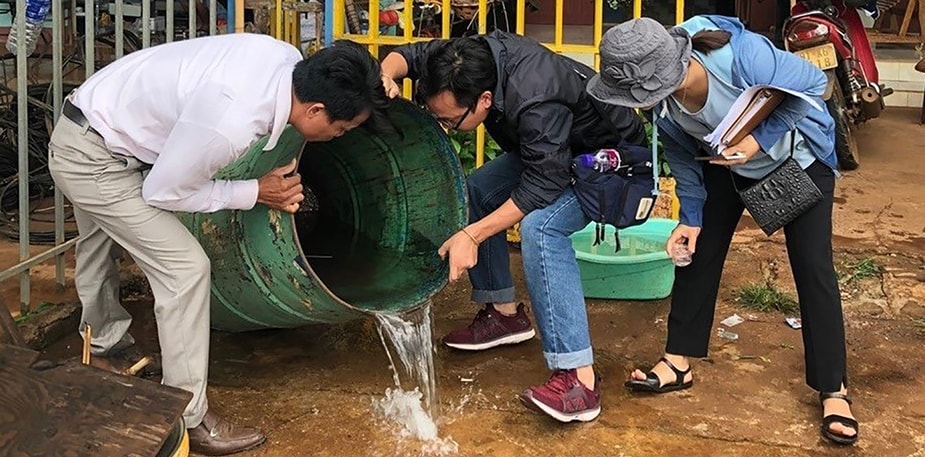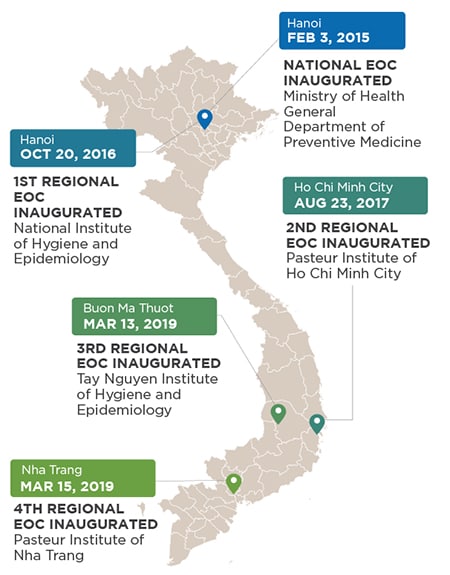Using Smart Tools in Vietnam to Improve Outbreak Response
December 9, 2019

FETP Fellow Trang Tran (far right) and virology technician Quan Le (center) from the Tay Nguyen Institute of Hygiene and Epidemiology, with Thai Mai (far left) from the Thang Hung Health commune station, check for mosquitoes during an investigation of a dengue outbreak in Vietnam’s Central Highlands. Photo: Lý Thị Thùy Trang
Dengue is a draining, mosquito-borne viral disease that infects an estimated 390 million people each year. Common in Vietnam, dengue poses a health risk to Vietnamese people and over 15 million travelers from around the world.
From March to April 2019, surveillance staff at the Tay Nguyen Institute of Hygiene and Epidemiology (TIHE) in Vietnam’s Central Highlands noted increased dengue cases in Gia Lai province. One district alone had seven times the number of cases during the first quarter of 2019 as the same period in 2018.
Hands-on Training Develops Disease Detectives
Ms. Trang Tran (now a member of TIHE’s surveillance team) was a fellow in Vietnam’s updated Field Epidemiology Training Program (FETP). In collaboration with CDC, Vietnam’s Ministry of Health revised the FETP course to improve the epidemiologic knowledge and skills of FETP fellows, or disease detectives, who detect, track, and stop diseases before outbreaks become epidemics. During this 12-week course, fellows participate in hands-on training, work closely with FETP mentors, and complete reports on outbreak investigations. This field work uses the learning-by-doing approach that has made FETP so successful around the world. As mentors support trainees, the mentors improve their own skills, thereby sustaining public health capacity.
As part of her required field work, Trang joined the Gia Lai provincial rapid response team to investigate the dengue outbreak. By applying what she learned as an FETP fellow, Trang was able to collect essential data and conduct data analysis that guided the province’s response to the outbreak. “Through the FETP workshops, hands-on practice, and mentoring, I improved my ability to interpret and analyze data, identify problems, and develop more useful reports,” said Trang. “FETP helped me understand the nature, scale, and cause of the outbreak and how to control it.”

Smarter Tools, Better Decisions
CDC and the U.S. Defense Threat Reduction Agency (DTRA) helped Vietnam establish a national network of Emergency Operations Centers (EOCs), which was completed in March 2019. The network, which includes one national and four regional EOCs, is crucial for surveillance and response to communicable diseases throughout the country. Trang was able to use newly available tools to compile, analyze, and interpret the data while working within TIHE’s EOC. “Trang’s investigation was a great opportunity for our Ministry of Health partners to leverage the investments provided by the U.S. government. Creating a synergistic result, an approach that can be applied to future outbreaks,” said Dr. Trang Do, Team Lead for Surveillance and Response, CDC Vietnam.
CDC and DTRA also supported the development of a data warehouse, a storage system that integrates national and regional data sources from laboratories, hospitals, and clinics. CDC helped TIHE develop an online portal for Trang to enter dengue data into the warehouse. Because the data warehouse is connected to TIHE’s EOC, Trang was able to immediately analyze, display, and share the data with decision makers. The EOC’s data warehouse provides Vietnam with the most advanced tools available for using data for public health decision-making.
Practice Makes Progress
By revising the FETP course, establishing the national EOC network, and developing a data warehouse, CDC provided smarter tools for Vietnam to make better public health decisions. Trang’s dengue investigation serves as a valuable reminder for surveillance staff to routinely use the EOC network and the data warehouse to effectively manage, analyze, and visualize data to control an outbreak. CDC continues to support Vietnam to use these tools in solving larger, more complex problems, such as newly emerging and imported diseases. “When our partners apply these tools to their unique context and in diverse situations, they become more comfortable and see them as a means to solving public health problems faster and better. That is the key to sustainability,” said Dr. Matthew Moore, Global Health Security Program Director, CDC Vietnam.
- Vietnam Tracks Multi-drug Resistant Bacteria, Winter 2017
- Vietnam Update: Community-Based Surveillance, Summer 2017